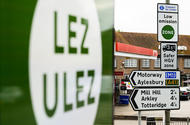Rising cost of motoring is set to become a key political battleground over the next decade
When the automotive industry has made the national headlines in recent years, it’s rarely been for positive reasons.
The latest example of this has been the expansion of the Ultra Low Emission Zone (ULEZ) in London, an environmental policy that’s already onto a loser in the popularity stakes by hitting people in their pockets.
Could the vociferous negative reaction to ULEZ that’s now spilled onto the streets with protests (and even seen cameras chopped down) be repeated as we head towards the government’s ban on the sale of internal combustion-engined vehicles in the next decade?
An expanded ULEZ is something we’ve known has been coming for a long time, yet as the date loomed the debate around it only gained in intensity as it dawned on people the policy really was going to start costing them money.
The 2030 ban has a longer run-in, yet here again we have an environmental policy that’s going to put a dent in voters’ wallets. While EVs surely will end up achieving cost parity with their ICE equivalents, the collateral damage has already been done: smaller, more affordable new cars are already a near-extinct breed, as they are no longer economical (or indeed profitable) for car makers. Investments have instead been diverted into battery-electric vehicles and something has had to give.
The crux of the opposition to ULEZ is that it’s seen as a tax on the poor, those unable to afford compliant vehicles, and the argument around the 2030 ban as its introduction comes over the horizon could quite easily follow a similar path.
The usual ‘well, you can always buy used’ argument undermines the very premise of the policy in the first place – and don’t forget that the government has still yet to reveal how it will fund the multi-billion tax shortfall from a fall in fuel duty revenue as more EVs take to the road. Don’t be surprised to simply see fuel duty increased over the next decade. Such a move would do wonders for the popularity of EVs amongst those that can’t afford them, no doubt…
Many have highlighted the removal of truly affordable new cars (let’s face it, an MG 4 might be a bargain amongst its EV peers at £26k but it’s not a £14k Dacia Sandero) as a societal issue governments will have to confront. The reaction to ULEZ has perhaps shown a glimpse of what’s to come.







